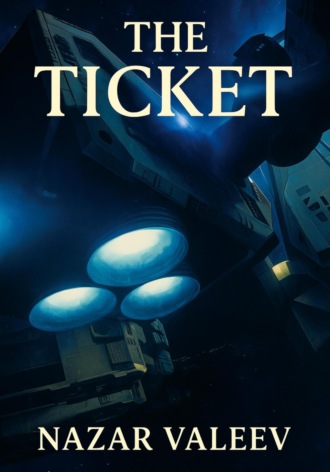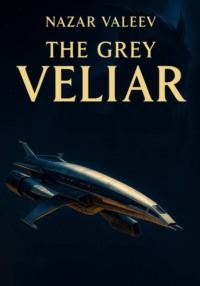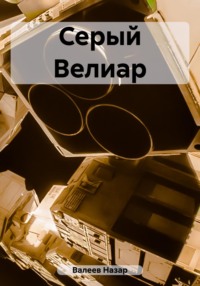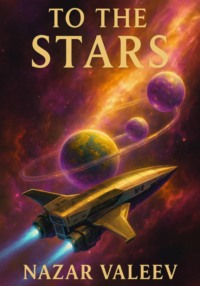
Полная версия
The Ticket

Назар Валеев
The Ticket
Chapter 1
Morning light seeped through the heavy curtains in bright crimson streaks. Kane woke earlier than usual, a rare thing for him, and lay still, waiting for the alarm to sound, too drained of energy and will to glance at the clock on the shelf.
«Another day of the grind… another march to the gallows», he muttered inwardly, burying himself deeper into the warmth of his blanket.
Work gave him nothing – no joy, no hope for the future. In truth, there was no future in it at all. Still, these days even a job like his counted as a stroke of luck, and people clung to such scraps fiercely, enduring the exploitation, the meager pay, and the company of colleagues who barely knew which way was up.
Still, Kane knew he had to get up, weave his way through the endless stacks of boxes piled with books on the floor, and fire up his laptop. Lately, every spare moment went into scouring the news, searching for any scrap of information about recent events.
It had been about three months since the unthinkable finally happened – the very thing people had long speculated about, written stories on, and argued over in countless fields. For generations, it lingered as little more than a stubborn dream, yet now it was reality: an alien intelligence from another corner of the galaxy had reached out to humanity. The first official contact took place in the Gobi Desert, where the newly formed United Government of Earth styled, in the fashion of the age, as the Alliance, met with them, its delegates drawn from the world’s leading nations. The aliens turned out to be humanoid too, bearing a striking resemblance to humans, though far larger – over two meters tall, broad-shouldered, with luminous golden eyes and skin the shade of ivory. Their hair looked like dreadlocks, and both their hands and feet bore six fingers. They breathed oxygen, just like humans, but their diet was mostly plant-based.
They might have looked friendly enough, but could they really be trusted? Humanity had always feared the unknown, and now, faced with a more advanced and powerful race, many began to wonder if we stood to lose far more than we could ever gain. That, at least, was the prevailing sentiment across forums and chatrooms, where every scrap of news or rumor was seized upon like a swarm of bees drawn to spring blossoms.
Kane, however, who, according to friends and coworkers, suffered from an incurable strain of optimism and always believed in the best: in luck, in sudden windfalls, or in some fantastic breakthrough, was nothing short of delighted to discover that we were not alone in the universe. That «those very aliens» were real. And naturally, what troubled him most were their intentions.
Yet even though considerable time had passed since first contact – an eternity for people who had been expecting sweeping changes any day, nothing of note had really happened. Life continued in its usual steady rhythm, and the Alliance leaders remained silent, offering no official statements. People seemed more reflective now, less restless, and many began to stop putting off things they had long wanted to do but, for one reason or another, never managed before.
Chapter 2
It was golden autumn, the season Kane longed for each year and truly cherished. The vivid blaze of falling leaves, the crystalline turquoise of the sky, and that peculiar sadness belonging only to this time of year somehow filled him with both solemn joy and a quiet hope that everything would turn out well. Yet an inner voice, its steady rhythm constantly broken by uneasy thoughts, kept whispering: how could this happen, and by what kind of miracle?
«Maybe it was on days like these that old Dürer conceived his enigmatic Melancholia. Or perhaps someone had simply gotten on his nerves, and he grabbed a sheet of copper and a hammer on a whim.» Such musings circled in Kane’s mind as he finished yet another lap around the stadium after a workday that felt endless, a day he tried to banish from memory. He wasn’t especially close to the world of art, but from his university literature course he remembered that particular figure. who, as far as he recalled, had been more of a painter than anything else.
For someone just past thirty, he was in fairly good physical shape and looked much younger than his age. Lately, he had been running more for a change of activity and also to put his thoughts in order after workdays. He had long noticed that running cleared his mind – probably simply because, when you run, everything inside your head gets shaken up, and the heavy thoughts, constructed and raised to a certain degree, just fall apart into pieces. Those pieces are almost impossible to put back together properly without a good rest and sleep, which already changes a lot at its core.
With a light step, Kane walked out of the locker room. After workouts like these, he always felt much better and calmer than before, as if he had finally done something truly worthwhile that day. In the dimly lit corridor, a watchman sat at a small table. He was an old man of about seventy. His clear gray-blue eyes held a thoughtful yet mischievous look and seemed incapable of concealing a single dark thought. A kind smile rested on his clean-shaven, sunburned face. It was his shift today, and the whole corridor smelled of freshly brewed strong tea with ginger and cinnamon. Kane privately called him the «intellectual granddad.» His bald head, a walking two-legged exam, had long been a real scarecrow to the local athletes, which was no surprise. Talking with him was like taking a test of wit: the old man could as easily wield a mop in his narrow passageway as recite lines from literary classics, toss out quotes from films of different years, and season it all with heroic couplets from all sorts of chivalric poems. And why not? Were athletes not knights as well? Most of the athletes, however, ended up flustered and tongue-tied, hurrying past him with nothing more than a respectful «hello» and «goodbye.»
The old man sat on a worn, hard chair, wrapped in a checkered wool blanket, hunched over as he watched the news on a small television perched on a little stand by the wall.
«Pour yourself some tea, son», he said warmly, taking the key to the locker room and sliding a fairly large thermos and a clean glass toward him. Kane usually had a bar of milk chocolate or a pack of sweet biscuits with him for just such occasions. He always enjoyed these short post-workout chats, remembering his own grandfather, a great lover of chocolate, whose company and conversations he still missed dearly, even after many years.
The news spoke of mysterious alien activity in Antarctica and at the North Pole. Wasn’t it astonishing? In just a few short weeks, temperatures at both poles had dropped by ten degrees – almost like before the troubles with global warming, and the massive ozone holes in those regions had nearly vanished, which was nothing short of incredible.
«Well, maybe the aliens will finally set things in order», the old man said, taking a long sip of tea. «Since we either can’t or simply don’t want to do it ourselves.»
«If only we could understand what they really want, and who they actually are…» Kane murmured thoughtfully, taking a sip from his glass and breathing in the fragrant aroma of the drink. «Because if they can change the climate so easily… what else are they capable of? How far do their powers reach? What other wonders might they be able to perform?»
It was no surprise that the local military almost immediately stopped rattling their weapons and flying back and forth over the desert. Especially after someone in Earth’s military government decided to give the bewildered aliens a live demonstration of human technology. The aliens had arrived at their first meeting in the desert on a single small ship, only to be surrounded by three layers of armored vehicles on the ground and a swarm of planes and helicopters overhead. In response, they simply activated some kind of force field, lifted everything around them into the air, turned it upside down, and then carefully set it all back on the ground, including the countless aircraft. After that, even the most aggressive hardliners realized that we were no match for them, and that the aliens surpassed us as much as we surpass the people of the Stone Age.
«I wonder what we could possibly give them in return», the old man said, half-questioningly, as he took off his glasses, wiped them, and put them back on. «Or rather – what is it that they themselves might want to take? Are we talking about so-called cooperation? Or friendship? Or will it all, sooner or later, come down to intervention and conquest?»
«Well, if they wanted to take everything over, they probably would have done it already», Kane replied, warming his hands on the hot glass and blowing on the tea the old man had just poured. «I don’t think things can get much worse», he added uncertainly. Like many others, Kane didn’t really understand what would come next. And although he truly was an optimist, and if not a pure believer in nothing but the good, then at least someone who hoped for it instinctively, he was often afraid to admit it even to himself, since reality had a way of putting everything in its place, regardless of hopes or dreams.
The old man, who had seen much in life, shook his head with a skeptical smile. «Poetry and optimism – that’s your lot, the young. For us, only dry and colorless facts remain», he said, scrunching up his nose so comically that his glasses jumped up onto his forehead.
Kane laughed. «I think you underestimate the grain of rationality on which the true essence of optimism mostly rests! Although, against the backdrop of our local ways, your so-called dry and colorless facts might themselves seem like sheer euphoria.»
He thanked the old man for his hospitality, who in turn was glad to spend an hour in conversation, then stepped outside and got into his car. The night was warm and almost windless, and Kane still felt the lingering heat from his run, mixed with the warmth of the hot ginger tea. He drove home along the lake, where the mirror-like surface reflected an unusually large yellow moon and a clear starry sky without a single cloud all the way to the horizon.
Suddenly the sky flared with a brilliant glow, and a giant pillar of light struck the lake at tremendous speed and with terrifying force. The powerful wave unleashed by that unknown energy easily overturned Kane’s car, rolling it several times in the torrent before lifting it dozens of meters into the air, hurling it onto the roadside, and then retreating back into the lake. Kane instinctively tried to unfasten his seatbelt and get out, but his legs were pinned so tightly he could not even move them. A sharp pain pierced his chest, his head spun violently, and then he lost consciousness.
Chapter 3
Maarv sat at the vast control panel, studying the climate readings with intense concentration. The multicolored indicators blinked cheerfully, flashing in turn with different lights – clear signs that new data was steadily arriving from Earth’s stations at the northern and southern poles of this picturesque planet. It was satisfying to know that everything was working properly and precisely, especially since he had personally written the program and chosen the equipment for restoring the climate conditions and returning them to a moderately favorable state.
He needed to prepare a report on the work completed, and Abuun, the head of this research mission, was known for neither patience nor a gentle disposition. Maarv was the youngest member of the team – by Earth’s reckoning, not yet three hundred years old, which by the standards of their race was still considered very young. Even so, he was already regarded as one of the best broad-profile specialists in planetary research.
Their homeland, the Vriin system – three inhabited planets populated by the Vriinians, lay far from this world, which in their own tongue they called Fraal, meaning Blue Planet, on the far side of the galaxy. For a long time, the Vriinians had been observing this planet. Over the course of several centuries, many research missions had come and gone, staffed with the most advanced scientists specializing in distant and peripheral regions of the galaxies. But it was Maarv who managed to calculate the planet’s climate point of no return. In fact, he became the chief initiator of the first official contact with Earth’s space organization, NASA, which later gathered under its aegis the strongest scientists of the world.
Maarv had convinced his people that further delay would doom humanity. In recent decades, the Fraalians themselves had advanced significantly in technology, yet all of this had taken a severe toll on the planet’s ecological and climate balance – something they had completely ignored. Had the Vriinians waited any longer, the tragic consequences for life on Fraal would already have been unavoidable.
After receiving Maarv’s detailed reports, Abuun held a serious discussion over space comms with the heads of the Vriin Senate. He sat at his massive desk, lost in thought, a holographic map of Fraal glowing before him, his large six-fingered hands clasped around his head. So deep was his concentration that he did not hear Maarv enter the control room, restless with impatience to learn the outcome of the talks.
The problem was proving to be quite serious, and it seemed there was no simple solution yet. According to the established Galactic Code, younger races were required to reach space on their own and begin their era of star-faring, declaring themselves before the Great Galactic Council.
When Abuun saw Maarv, his gaze warmed. He liked this young scientist, who bore the hardships of the expedition with such dignity, refusing to leave the mobile orbital station for the third term in a row.
«The Vriin Senate has still not reached any common ground», Abuun said at last, letting out a heavy sigh. For a while he sat in silence, staring off into the distance. Then, turning to Maarv, he continued: «On one side, they are under strong pressure from the Chamber of Trade along with the Caste of Warriors. Fraal’s resources give them no peace, and they dream only of finding some pretext to seize them.» He spread his hands slightly, as if to show the scale of the problem. «And with such a vast population, there would surely be many eager to move to our new colonies in the Perseus Arm, where valuable minerals are plentiful.» Abuun frowned, rubbed the bridge of his nose, and added quietly: «On the other side stand the Caste of Scholars and the Caste of Priests, who for generations have studied the inhabitants of Fraal. They believe these beings must not be allowed to leave their planet. This aggression gene…» He paused, shaking his head. «It causes unease in many of our scientific circles. The emotional nature of the Fraalians cannot be analyzed at all.»
He rose from the desk, walked a few steps across the control room, and halted before the hologram of Fraal. His voice grew firmer: «But the chief difficulty is that some leaders from the Caste of Warriors and the Caste of Priests are proposing to conceal from the Great Council the very fact of contact with Fraal. More than that – to veto the resolution we drafted on the Blue Planet.»
Abuun waved his hand sharply, as if cutting the matter short. «I believe this is a grave violation of the intergalactic convention. And we are risking far too much for the sake of someone’s unhealthy ambitions.»
The political system of Vriin bore some resemblance to the political structure of many nations on Fraal. The nominal head of government over their three planets – Minor Vriin, Pruun, and Tlaan was the supreme ruler, Raam, who led the entire system as its chief authority. Yet there was also the Senate of Vriin, made up largely of members from several of the system’s most influential clans.
The Vriinians were a mature humanoid race, held in high esteem and wielding considerable influence in the Great Galactic Council, which governed all the known star worlds. The Great Council had its own small army and a flotilla of modern ships, answerable only to its members, carrying out various assignments, resolving interplanetary conflicts, conducting investigations, and undertaking missions across different parts of the known galaxies.
Frustrated, Maarv left the control room – he had expected the Senate to deliver some kind of clear and balanced decision. On the other hand, how could they reach any conclusion when not one of them had bothered to come here and see it all with their own eyes? Perhaps they were simply afraid, for it was not every day that a mature race stumbled upon such a planet and made contact with an intelligent population. And the responsibility, should anything go wrong, carried consequences severe enough to cost them their positions – no one in the Senate was willing to take that risk.
After his conversation with the wise Abuun, Maarv himself was no longer entirely sure which decision he favored. He felt a sharp lack of information, which both angered him and put him in a combative frame of mind. «Is it possible», he thought, «that after spending so much time here I still cannot see how we ought to proceed, simply because we sit locked away, following the foolish decrees of cowardly politicians?» A plan was forming in his mind, one that somehow had to be carried out.
Although unsanctioned contacts were strictly forbidden and the Caste of Warriors kept tight control over the entire near-Earth perimeter, Maarv decided to descend to the planet. He sincerely believed that the issue of heightened human aggression, so actively promoted by certain voices in the Vriin Council, was insignificant and irrelevant.
The Fraalians, as a new species, fascinated him, yet he had never before encountered humans face-to-face. Nevertheless, there were many humanoid races across the known galaxies, and even in the Great Council the peoples of the elder races held a certain number of seats. Among them were the mysterious Lyrians – one of the most powerful in the Galactic Union. They served as guardians of the galaxy and, at their own discretion, could intervene and put a stop to conflicts of planetary scale.
While Maarv was working out how to slip unnoticed onto the engineering deck and from there into the teleport section, he was at the same time preparing the necessary equipment. In the end, it all came down to a single small device called a confluator, which fastened conveniently to his belt. It was synchronized with all the essential systems of their research station and could do much – both for the safety of its owner and for defense or attack. Maarv tried not to dwell on the latter. Although he had undergone all the grueling training required of deep-space scouts, he had no desire to bring those memories back to life.
On the engineering deck stood guard Draam himself, personally responsible for the station’s security. Even by the standards of the Vriinians who for the most part were not known for sentimentality he was still less inclined to show such emotions, at least in public. Any request outside his direct duties seemed simply to bounce off his face, as if it had been cast from the hardest metal. There was a saying that if the ship ever suffered a breach, it could be patched with Draam himself, and it would be even stronger than before.
Food was his only weakness, despite his excellent physical condition. And so, passing the time today with a sort of chess-like game and recalling the cooking of home, he suddenly caught the sharp scent of spices so familiar and dear to him.
«Without a doubt», he thought, «that aroma could only come from kret! The famous Vriinyan galettes are brewed on the rarest, most aged spices, and that heady smell was coming from the storeroom.»
As soon as Draam stepped into the storage bay, the bulkhead closed silently behind him. He noticed it, but he also saw a lone box of kret.
«I’ll eat it all first», he mumbled, closing his eyes in pleasure as he slowly chewed a galette, «and then I’ll punish – punish them cruelly!»
Seeing that Draam had fallen into the trap, Maarv ran full out for the teleport bay – the small box of kret from his carefully kept personal stash would not hold the large, voracious Draam for long. He knew he would have to jump blind, so that no one could trace the arrival point, and that carried considerable risk – you never knew where you might end up. But he had made his decision, and there was no turning back. He selected the proper coordinates, powered up the portal, waited until it reached full strength, and then stepped resolutely into the boiling stream of light.
Chapter 4
Kane was slowly regaining consciousness, though he still had no desire to open his eyes. The pain in his chest was beginning to fade, and the unpleasant chill had fully brought him back to awareness. Suddenly he remembered what had happened, and with surprise he pushed himself up on his elbows, trying to understand how he had managed to escape from the overturned car. The last thing he recalled did not match what he was feeling now.
The sun had not yet risen, but Kane clearly saw the silhouette of a tall figure. In his hands he held a strange device that emitted a crimson glow, casting light across the clearing. The man was dressed oddly – in a heavy, leather-like cloak of a dirty green color, trousers of the same shade with ridges of some matte, dark-blue-tinged metal, and massive boots to match the rest of the outfit.
With a gesture he motioned for Kane to stay on the ground. Still feeling weak, Kane thought it unwise to remain lying in front of a stranger and tried to stand anyway, but his head spun and he nearly collapsed. The stranger caught him, helped him sit, and placed in his palm a small plate the size of a coin, indicating with his hand that it should be pressed against his temple.
The plate was perfectly smooth, pleasant to the touch, and somehow clung to his palm like a magnet. It shifted its hue to match his skin, becoming almost invisible and weightless. No sooner had Kane pressed it to his head than he distinctly heard a powerful voice.
«Greetings, Earthman!»
«Hello», Kane replied politely and cautiously, once the nausea had subsided and the dizziness had passed – too astonished by everything happening to say anything more coherent. «Yeah… hello», he repeated uncertainly. Or rather, he thought it.
«How convenient», he muttered. «If it’s not too much trouble, could you briefly explain what just happened here, and who you are?»
«I came from afar», the alien answered, pointing to the sky. «From a very distant star.»
«Wonderful», Kane replied, a little resentfully, suddenly feeling like a native from the time of Columbus. «For such a highly intellectual conversation we could have done without this mind-gadget. And by the way, it wouldn’t hurt if you turned the volume down a bit!»
«My apologies, native», the alien caught the word from the torrent of Kane’s scattered thoughts. «You were seriously injured by the shockwave of the teleport. That… mm… happened by accident.» There was a trace of embarrassment in his thoughts. «I had to heal your injuries while you were unconscious.»
«All right», Kane said, taking a deep breath and exhaling. «First of all, my name is Kane. Second… thank you for patching me up – my knee doesn’t even ache anymore. Ever thought of applying to a local clinic? You’d be priceless there», he tried to joke. «And what’s your name? Where are the rest of your…»
Kane wanted to say «alien people», but it didn’t seem polite or appropriate. «…I mean, the others – the ones our news channels are buzzing about?» he finished with difficulty.
«I came here alone», the stranger replied. «My name is Maarv. And what is a «clinic»?»
«Oh», Kane perked up at last. «It’s a place where specially trained people try, in cases of urgent need, to do what you just did, but usually without success. Well, yes, sometimes someone gets lucky – in exceptional cases. There are still doctors with a real gift, but they’re very rare.»
«These ‘doctors with a real gift’», Maarv repeated in surprise. «They can regenerate organic matter?»









